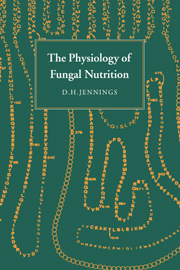Book contents
- Frontmatter
- Contents
- Introduction
- 1 Primary active transport
- 2 The relationship between membrane transport and growth
- 3 Walls and membranes
- 4 The vacuolar compartment (vacuole)
- 5 Carbon
- 6 Nitrogen
- 7 Phosphorus
- 8 Sulphur
- 9 Growth factors
- 10 Potassium and other alkali metal cations
- 11 Multivalent metals (required or toxic)
- 12 Organic acids
- 13 Water relations and salinity
- 14 Nutrient movement within the colony
- Literature cited
- Index
10 - Potassium and other alkali metal cations
Published online by Cambridge University Press: 14 September 2009
- Frontmatter
- Contents
- Introduction
- 1 Primary active transport
- 2 The relationship between membrane transport and growth
- 3 Walls and membranes
- 4 The vacuolar compartment (vacuole)
- 5 Carbon
- 6 Nitrogen
- 7 Phosphorus
- 8 Sulphur
- 9 Growth factors
- 10 Potassium and other alkali metal cations
- 11 Multivalent metals (required or toxic)
- 12 Organic acids
- 13 Water relations and salinity
- 14 Nutrient movement within the colony
- Literature cited
- Index
Summary
Introduction
Although this chapter deals with transport of the alkali metal cations as a group, it focuses on potassium. That is because potassium is an essential element for all fungi. Of the other alkali metal cations, sodium appears to be required at relatively high concentrations (in the millimolar range) for a small group of lower marine fungi (see Chapter 13). There is no evidence that sodium is required as a microelement for the simple reason that producing sodium-free media for use with the great majority of fungi demands an intensity of effort that is not matched by the probability of a rewarding outcome, i.e. that it will be possible to demonstrate a requirement. Interest in caesium transport and accumulation in those basidiomycetes producing large fruiting bodies, some of which might be used for human consumption, has developed as a consequence of the release of 137Cs and 134Cs isotopes from the nuclear reactor at Chernobyl, Ukraine, in 1986. In particular, comparison of the relationship between the ratios of the two isotopes found in such fungi with that of the emissions from the reactor has indicated that there might have been considerable accumulation of and maintenance within mycelium of significant levels of caesium from pre-Chernobyl weapons-testing (Byrne, 1988; Dighton & Horrill, 1988).
Evans & Sorger (1966), in their seminal review of the role of univalent cations in green plant nutrition, pointed out that potassium and other univalent cations function as cofactors for a wide variety of enzymes throughout the living world.
- Type
- Chapter
- Information
- The Physiology of Fungal Nutrition , pp. 317 - 335Publisher: Cambridge University PressPrint publication year: 1995



